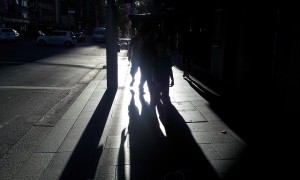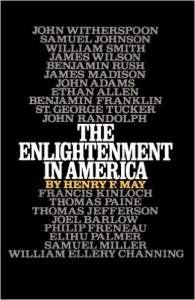 I wrote the following post in part for a series at HOTCUS called “Teaching America.” It will soon be cross-posted there along with a contribution from Andrew Hartman (among others).
I wrote the following post in part for a series at HOTCUS called “Teaching America.” It will soon be cross-posted there along with a contribution from Andrew Hartman (among others).
I can’t help but admire social historians when they write with great specificity and detail about the lives of people, weaving choices and actions into a drama that often takes place on a grand historical stage such as the Great Depression, or World War II, or the national crises of the 1970s. Recently I have been guiding students through a reading of two excellent social histories of the 1970s, Jefferson Cowie’s Stayin’ Alive and Robert Self’s All in the Family. Of course, such reading also gives me an opportunity to dive into the popular culture of the decade, so I showed students the first episode of All in the Family entitled, “Meet the Bunkers.” It is safe to say that my students were shocked by this introduction.
What surprised me, though, wasn’t Archie’s legendary bigotry, but the utterly over-the-top reaction he had to a specific and quiet comment from his daughter and her husband (“Meathead”). Archie and Edith had just returned from a church service to find that their daughter had prepared a brunch to celebrate their twenty-second wedding anniversary. Archie announced that he could only endure half of the reverend’s “socialist” sermon before walking out. Protestations to the contrary, though, once at home Archie finds his faith. After Edith scolds Archie “God will punish you” for making yet another derogatory remark about the minister, Archie’s son-in-law and daughter reply with quiet resignation, “What God?” Archie goes ballistic: he yells to Edith, “Did you hear that? Did you hear that?” Getting up from the table he rants: “I knew we had a couple of Pinkos here Edith but I didn’t know we had a couple of atheists!”
https://youtu.be/95sIQiI6g5Q?t=10m19s
While that comment appeared in a string a truly remarkable hyperbolic declarations about everything from welfare to Jews, Archie’s level of outrage over the questioning of God’s existence echoed the wonderfully complicated history Americans have with religion. It also allowed me an opportunity to launch into a plea that generations of scholars who do intellectual and religious history are best able to explain Archie’s reaction. No offense to social historians who bring us the histories of flesh and blood people, but I am happy to be part of this collaboration between religion and American thought that investigates the ideational shadows cast by those historical actors.
 We might state bluntly that the relationship between U.S. intellectual history and religious studies constitutes the pivot on which both move. Henry F. May
We might state bluntly that the relationship between U.S. intellectual history and religious studies constitutes the pivot on which both move. Henry F. May
, one of the godfathers of contemporary U.S. intellectual history, made this evident in his masterful The Enlightenment in America (1976). David Hollinger, one of May’s most prolific and influential students, carried the scholarly conversation between religion and modern thought to debates in the twentieth century over science, secularism, and ultimately the grand rapprochement between Protestantism and the Enlightenment. In a recent book of essays entitled, After Cloven Tongues of Fire, Hollinger argued, “The world that American Protestants and their progeny eventually made their own, in cooperation with Americans who had no Protestant past whatsoever, is a vast expanse encompassing disperse elements of culture from throughout the globe. The Enlightenment was destined to be a great provider of stepping-stones for European-derived American Protestants because the Enlightenment was largely a product of European self-scrutiny in the first place.” (15) Hollinger brought May’s original thesis that posited the religious origins of Enlightenment to its eventual conclusion by demonstrating how American Protestantism broadened and changed its intellectual structure because of the Enlightenment.
S-USIH has spent its brief history productively advancing the conversation heavily influenced by May and Hollinger. Since the first conference in 2009, S-USIH has hosted a steadily increasing number of discussions by religious scholars and between religious historians and their intellectual brethren. Looking back over the seven conferences (including the one cancelled because of Hurricane Sandy in 2012 and the one scheduled this year in DC), offers a pretty good list of scholars taking up the May-Hollinger charge. David Sehat presented a paper on his book (which in 2010 had not yet been released) entitled The Myth of American Religious Freedom on a panel that also included Christopher Hickman and Ethan Schrum with comments from one of the fiercest religious historians, Eugene McCarraher. At that same conference, Matthew Avery Sutton and Christopher McKnight Nichols introduced their forthcoming books—Matt on apocalypticism in America Evangelical thought, and Chis on the tortured history of isolationism and the intellectuals (many religious) associated with it. Presiding over their panel and challenging their conclusions was Leo Ribuffo, a scholar who provided the most severe intervention to the arc of Protestant accommodation with the Enlightenment in his great book, The Old Christian Right: The Protestant Far Right from the Great Depression to the Cold War.
Other conferences have included members of the prestigious (and prolific) Young Scholars in American Religion run through the Center for Religion and American Culture at IUPUI, Edward Blum, Matthew Hedstrom, Amy Koehlinger, Kip Kosek, Tisa Wegner, and Kathryn Lofton who delivered the keynote at the 2014 conference held in Indianapolis. In other years, William Inboden and K. Healan Gaston offered contrasting portraits of Reinhold Niebuhr from their books with Gary Dorrien, perhaps the foremost scholar on Niebuhr, providing comments. Daniel K. Williams previewed what will soon be his newest book on the abortion debates among Catholics and Protestants in the years leading up to Roe v. Wade, and Leilah Danielson provided an overview of her groundbreaking book on perhaps the most significant pacifist in twentieth century America, A.J. Muste. In 2011, Molly Worthen offered a master class on the argument she made in her recent book, Apostles of Reason: The Crisis of Authority in American Evangelicalism and in 2014, Amy Kittelstrom did much the same when she delivered remarks demonstrating the depth and breadth of her 2015 book, The Religion of Democracy: Seven Liberals and the American Moral Tradition.
Intellectual historians and religious studies scholars make natural collaborators these days because the cultural turn in historical scholarship influenced their fields in similar ways. Both turned inward to interrogate the assumptions on which they are based—in other words they asked, respectively, who or what is an intellectual and what is religion? The cultural turn also forced an opening to other fields and disciplines as both have been influenced in very similar ways by post-colonial theory and studies in cosmopolitanism, encouraging projects that emphasized patterns that resist categories of elite-centric focus and simple classification by race, class, and gender. I mean to suggest this dusky nature of human experience by using the metaphor of shadows in history. The clarity with which we see social types in history—the working class, feminists, African-Americans—has an essential corollary of thought and belief that often disrupt those categories. See you in the shadows.

0